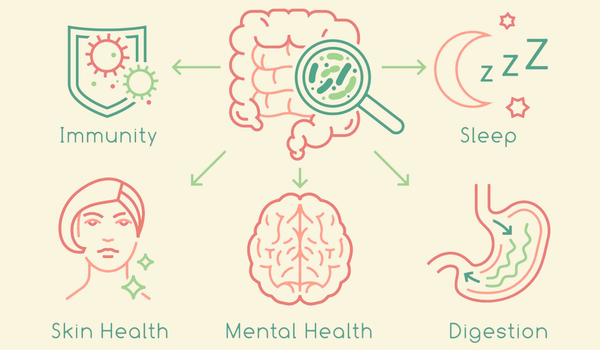No Products in the Cart
Gut health refers to the condition of the digestive tract, which begins from the mouth, through the oesophagus to the bowel.
This system is responsible for breaking down food into the specific elements that our bodies use to function, such as nutrients, vitamins, and minerals.

The gut serves as a host to billions of microorganisms; both beneficial and harmful that are crucial for digestion, immune regulation, and protection against infectious agents. These microbes collectively make up the gut microbiome and it is important to maintain a good balance of the gut microbiome.
Maintaining a healthy gut is very crucial for your overall health and well-being.
However, there are many factors such as diet, lifestyle, and environment that can negatively influence your gut microbiome.

When there is an imbalance between your gut’s microbiota (good bacteria and bad bacteria), it is referred to as dysbiosis.
Some actions that can cause harm to your gut health include:
A healthy gut flora is typically thought to be one that is abundant and diversified (Heiman & Greenway, 2016).
Your vulnerability to the negative effects of infections and drugs increases when your gut flora is not diverse (Claesson et al., 2012).
Enriching your diet with a diverse range of fruits, vegetables, and whole grains has the potential of making your gut flora diverse.
Research has shown that it takes just a few days to cause an alteration in your gut flora by changing your diet (Heiman & Greenway, 2016; David et al., 2013; Sonnenburg et al., 2016).
Lack of diversity in the gut flora can therefore be caused by a diet that excludes a wide range of complete foods. Numerous harmful health repercussions could result from this.
Prebiotics are fiber-rich foods that pass through the gut system undigested and promote the growth and function of the gut microbiome (Gibson et al., 2017).
Examples of foods that are high in prebiotics include onions, asparagus, nuts, oats, garlic, banana, leeks, lentils, chickpeas, and beans.
Antibiotics are prescription drugs used to treat bacterial infections and disorders like urinary tract infections (UTIs). Despite their advantages in the treatment of diseases, both healthy and harmful bacteria are negatively impacted by them. Antibiotic use frequently results in detrimental changes to the variety and composition of the gut microbiota, even when administered for a short time (Sullivan et al., 2001; Huse et al., 2008).
It has been established that prolonged stress is bad for the body. It is no surprise that stress also has the power to alter the gut's microbiome by increasing sensitivity, reducing blood flow, and causing dysbiosis (Bhatia & Tandon, 2005).
Chronic alcohol consumption can lead to dysbiosis within the gut microbiota.
According to Mutlu et al. (2012), dysbiosis has been linked to alcoholic populations compared to individuals who consumed little-to-no alcohol.
On the other hand, polyphenol-based drinks such as red wine consumed in moderation are known to improve gut health (Queipo-Ortuño et al., 2012).
Your gut bacteria may get harmed if your biological clock is thrown off by lack of sleep, shift work, and late-night eating (Polidarová et al., 2011).
Smoking is harmful to almost every organ in the body.
Compared to non-smokers, smokers are twice as likely to suffer from Crohn's disease, a prevalent form of inflammatory bowel illness (Calkins, 1989).
Quitting smoking can increase the variety of gut flora, which in turn can enhance gut health.
Noticeable symptoms of an unhealthy gut may include:

By altering your lifestyle and nutrition, you can greatly enhance your gut microbiota composition. Among the methods are:
Aside from the benefit of weight loss, decrease stress levels, and decrease risk of chronic diseases (Booth et al., 2012; Meyer et al., 2016), physical activity can also alter gut microbiota thereby improving gut health (Monda et al., 2017).
All things considered, the gut is an essential system that plays a role in digestion, nutritional absorption, immunological function, and potential interactions with the brain.
Your gut bacteria can be harmed by dietary and lifestyle choices, such as inactivity, drinking, smoking, and poor sleep.
The best method to ensure a healthy gut flora is to have a healthy lifestyle that includes regular exercise, little stress, and a variety of good meals.
With our busy lifestyles having a perfectly balanced diet is difficult. Regular consumption of fermented foods could help to offset an incomplete diet and top up your gut with beneficial microbes.